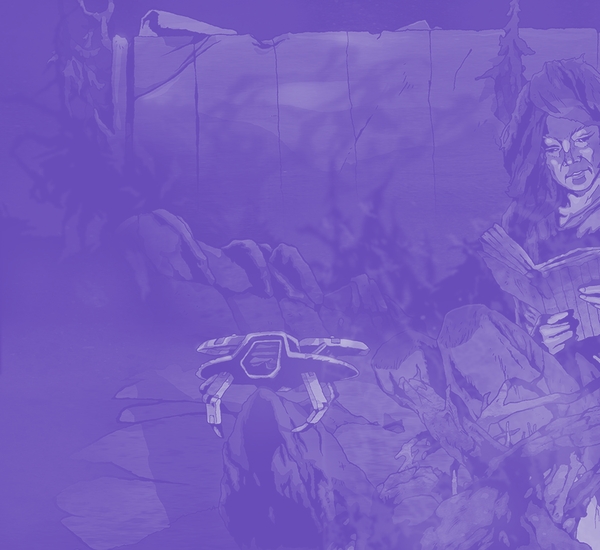Motivation
At the start of 2021, as the UK came out of Covid lockdown and I finished my Black Archive on The Talons of Weng-Chiang, I decided I wanted to get some more short stories published. I like writing short stories, and I’d realised that I was only really writing them now when people asked me if I would, and that averaged out at around one a year. Short stories are - you’ll be unsurprised to hear - quicker to write than novels or book-length essays on 1970s television programmes, and frankly if I liked writing them there was no good reason why I couldn’t produce them faster than that. I’d also started listening to the Escape Pod and Clarkesworld podcasts, and that opened my eyes to how many places there were out there looking for the kind of stories that I liked to write.
I’d written a couple of stories prior to Joy that had been rejected from both those podcasts and more, but I was still trying. In July 2021, Escape Pod announced they were looking for submissions on the theme of “Joy”, and I resolved to have a story ready for them.
Inspiration
I’d recently had an enjoyable day out in Blackpool, and the landscape and recent announcements in the news about Amazon’s hopes for drone deliveries had given me an image of a woman on the beach shooting at passing drones. I wasn’t quite sure what I was going to do with it, but Escape Pod’s call for stories about “joy” also made me think about the simple joy of reading bedtime stories to my children, something my youngest had just announced it was time to stop. The two ideas came together, and I knew what my submission would be.
Getting the Story
The deadline for submissions wasn’t particularly tight, but it did mean I didn’t have a lot of time to leave the story to mature, both before and after it was written. I knuckled down and got it finished, submitting it to deadline and moving on to something else. It wasn’t long before I got a response from Escape Pod: they didn’t want the story. But as part of their rejection, they did something that is getting increasingly rare: they gave me some feedback on why. It wasn’t an essay, just a single line saying that they thought the character’s goal for the story - what Joy wanted and needed - wasn’t clear enough. Having had some time away from the story, I could see that they were right. When I next had the chance, I reworked the story to make Joy’s situation, motivation and goal a little bit clearer, tidying up some of the unnecessary detail as I went. Once I had another draft that I was happy with, and after letting it compost a little, I sent it off somewhere else.
And a little while later, it came back to me again, rejected. But again, I had been given just a little bit of feedback: a single line that said they’d liked the story, but felt its pacing was off, particularly at the start where it took a long time for the story to get going.
I realised I needed a structure. Usually, for novels and anything longform, I would always start with a structure that fit what I wanted to do. But for short stories, I usually wrote by the seat of my pants. It had always worked for me before, but then I had always found a good structure helpful and even pleasing whenever I used them. I had just read a piece by a writer talking about how they used the Seven Point Structure to plot a short story, and it seemed to fit what I was trying to do. I restructured my story to fit the 7 points, and was pleased to find it tightened everything up, forcing a lot more extraneous incident to get removed from the start of the story and let things get started pretty much straight away.
I was a lot happier with things now, and sent it off to another magazine. It was rejected again, this time without feedback, but I was getting used to that. Joy joined my growing library of short stories slowly making their way around all the places I could think of that might take it, and the majority of my attention went on newer stories.
The Pitch
At the end of 2022, I joined Mastodon, where I found Interzone waiting for me, which was just relaunching after a change in publisher. I wanted to send them something to start the ball rolling with them, and when Joy was rejected by another publisher in January 2023 I knew where it would go next. I reviewed the story again - as I always do before submitting something somewhere new - and found that despite it being two years old there were still a couple of tweaks I wanted to make. Then I sent it in to Gareth Jelley, the new publisher and editor of Interzone.
When I’m reading submissions and something catches my eye - particularly if the author is completely new to me, or has never submitted to IZ before - I’ll give it a very close read. Your name did ring a bell, probably because of Doctor Who: Heritage, and I now realise you wrote some Brief Encounter shorts for DWM, way back when (I almost certainly read ‘Front Line’ at the time); but it was the strength of the opening that really got me looking at it more closely, and considering it for IZ Digital, Interzone’s online sister zine.
In March, Gareth replied to my submission and said that he would like to publish Joy in IZ Digital.
I loved how quickly the character and the world came into sharp focus; and also how right away — ‘Don’t,’ the drone whimpered. ‘Please.’ — there was a compelling narrative hook. So you had me wanting to know more about Joy, about this world, and about the drone. All very artfully done in less than 300 words.
Editorial
Gareth had some minor edits he wanted to make to the story, mostly fixing typos or syntax to make everything clearer. There was one moment that he wanted to expand on, giving a bit more impact in the story. He suggested some additional wording to slow the scene down, and I was happy with all but one section of it:
I made a suggestion about dialogue in one scene and I’m very happy I did as your tweak was great.
The line he added I thought altered how the main character responded to a line from the story they were reading, and reduced the emotional impact for them. I suggested an alternate line that had the same effect Gareth wanted without changing the impact on the character. Fortunately Gareth agreed, and liked my version better. With that, the story was accepted.
It was straightforward. The pacing of the story was great and I thought the ending worked very well. Editing ‘Joy’ has been… an absolute joy!
What happened next?
With the story accepted, Gareth said it might be a while before it got published. I responded by sending him another couple of stories, the first of which was rejected and the other is working it’s way through the process. Then at the beginning of June, Gareth got in touch with a copy of Martin Hanford’s beautiful illustration for the story and let me know that he was intending to publish it on the 7th June. I really hope I can work with Gareth again in the future, and I’m looking forward to you being able to read Joy; but that’s not the main thing I want you to take from this process.
The things Gareth liked about the story - the character, the pacing - were there for him to see because of the feedback I got when the earlier versions of the story were rejected. Without that feedback, Joy would have been rejected by Interzone as well, and would still be making its way around the list of potential publishers, getting rightly rejected. If you find somewhere that gives you feedback on your stories, even if they never ever accept a single thing you send them, that is the most valuable resource you have as a writer. They should be the first place you send your stories, and you should take the time to think about what they’ve said and whether you agree before you send the story out the door again. Feedback is a valuable resource, and it’s getting rarer and rarer because it takes time and publishing is a hard job: if you’re lucky enough to find someone who takes the time to give it, make sure you appreciate it.
And then, on 20th February 2025, something very exciting happened: some publishers accept reprints, and Escape Pod are one of them. Even though they’d originally rejected the story before it was rewritten, I thought I’d give it one last chance: after all, it had felt like a nearly. So I sent it in, and they said yes. Episode 981 of the Escape Pod podcast was duly posted, Joy by Dale Smith. This officially makes Joy my most successful piece of writing, the only thing that has been published twice without any rewriting. The symmetry of it being Escape Pod - the place the story was written for - was exceptionally pleasing, as was listening to the episode itself. Hopefully you’ll enjoy it as much as I did, and give Joy another look in this new format.


